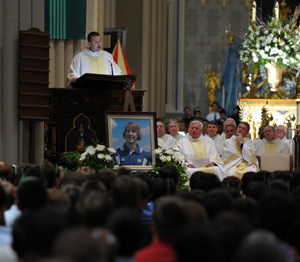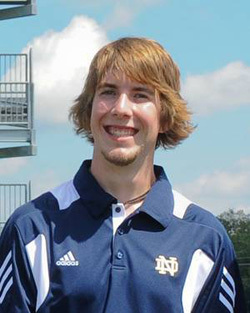
Homily by Rev. Thomas C. Doyle, C.S.C., given at Mass of Remembrance for Declan Sullivan, October 28, 2010 in the Basilica of the Sacred Heart, University of Notre Dame.
Mary, our Blessed Mother after whom this University is named, shed tears at the loss of her Son. Her tears fell again last night and this night, and they fall with yours Barry, Allison, Wyn and Mac. Mary, Notre Dame has lost another Son. In time Notre Dame’s sadness was transformed into joy, dark became light, death overcome with resurrection . . . and in time, your sadness will be transformed too. And in the meantime, we stand with you.
Notre Dame is a place of tradition. The strands of history are woven proudly and tightly through the telling of stories. Stories orient us. They tell us where we have been and they spray bright color on the canvas of where we are going.
Our stories connect what is now the finest Catholic University in the world to a single log cabin on cold November day 167 years ago. Tonight there are 1,000 of us under a muraled and gold leafed roof and hundreds more standing vigil outside in the cool night. Then they were eight, a priest and seven brothers under leaky wooden shakes. The written, sung and oral tales about this sacred enterprise can appear to be the canon of stories about unbridled blessings. Most days, we live in what feels like the bliss of Eden before the fall.
But there are times, in all of our lives, when things happen to us and among us that we might not feel that we have a story to orient us. The experience is so foreign, hard to fathom, so unlike anything that we ever thought we would have to deal with, that we feel lost. And being lost leads to fear, sadness, isolation, guilt and anger – or just a strange detachment that leaves us feel as if we are so disconnected that we might just float away.
Every time we experience death, and particularly yesterday in the wake of Declan’s passing – we encounter one of those foreign, unthinkable, hard to imagine events. It’s as if we are children who want to yell out: “Mom and Dad, I don’t know how this fits into any story. Lord, have you forgotten us and written us all out of the book of life?”
No. We have not fallen off the page. No. We are not lost. Yes. There are stories that tells us exactly where we are, who we are, and where we are going. And the stories told in today’s readings, the St. Paul’s letter to the Romans and the Gospel of John. Despite the feelings of loss and disorientation, tonight’s stories, and the story of our being here together tell us: We are loved . . . and we are not alone. The divine scripture, this crowded Basilica, those holding vigil outside, the body and blood of Christ that we share not only remind us, but they show us in high drama: that we are loved . . . and we are not alone.
Declan was a story teller. And while Declan could tell a good tale and write a captivating essay . . . his preferred medium for story telling was through the lens of a camera. Capturing the texture of life on film was the passion and the way that Declan created stories that gave meaning and orientation to life.

Those who did not know Declan may be inclined to say that capturing stories through the lens of a camera was what ultimately robbed him of life. But those who know him will summarily reject such a myopic byline because you know that telling stories through the lens of a camera is how Declan lived.
Declan loved film. He must have loved film because through his lens he could direct his audience’s gaze on what he found to be amazing, remarkable and extraordinary about life. He had the audacity to tunnel and focus our vision not merely to the totality of the whole horizon before us . . . but rather to some unique, and revealing patch. As if suggesting that the paradox, the mystery, the glory of life can be revealed by a very close study of a tiny space . . . . that if we look closely enough we will see the infinite within the finite.
This same craft of story telling, in a different medium, was the same pedagogy of Jesus Christ. Jesus told stories that changed the perspective of those who listened closely. He drew their gaze to what seemed familiar and revealed it in a new resplendent way. “Do not let your hearts be troubled. . . . I am going to prepare a place for you. And I will come back again to take you. In my Father’s house there are many mansions.” So to those whose hearts were troubled by what they felt and saw in the world . . . Jesus says to them that their end will not be in this trouble, but rather their destiny in this life and the next is to be with Him.
“But Master, how can we know the way?” to which Jesus says, “I am the way.” He does not say, “There is the destination.” Or, “Go down to the olive grove and take a left.” He says that the promised land will be found in the way that you travel with me. The lens that Jesus used refocused the fearful lot was to take them from their particular place of fear . . . saying your peace is not found in a destination . . . it is found in a way and with whom you travel. Do not let your hearts be troubled for: You are loved . . . and you are not alone.
Declan was an artist and an adventurer. And the focus of his lens on life was like a magnifying glass. Declan was the personification of intense, purposeful enthusiasm. He loved life and poured himself into the parts that he identified as the most interesting: the study of film, adventure, road trips, celebration. Declan couldn’t have just one job; there were too many cool things to explore. Filming for football. Filming about astrophysics. Buying and selling used text books. Declan was slated to go off to study in China next semester. Why not go to a place in the world that is the most different from the world that he knew? But more than things, Declan’s most intense enthusiasm was not directed at things, it was focused on people. His family, his friends from high school and college, his fellow workers, his dorm mates. This is where Declan discovered the stories that gave meaning and orientation to his life. And Declan’s life was a bright and brilliant one indeed.
But does the sad and unthinkable reality that Declan had only 20 years of life render his stories, or our version of the story of his life unintelligible? Forbidden to tell no more? Are we now mute and illiterate such that the story of Declan’s life is erased? Does his fall mean that he, and we, have fallen off the pages of the book of life?
No! Declan is loved, and he is not alone. And we are loved and we are not alone. There is a remarkable phrase that we hear in the preface of the Eucharistic prayer for Christian death. We will hear, “for those who belong to Christ, life has changed, it has not ended.” For Declan Sullivan “life has changed, but it has not ended.” This is the lens that our faith that God invites us to at the moment of infinite trial. God’s promise is that Declan is loved. He is not alone. And in the story written by Christ, Declan now lives in the most full essence of his Being.
For nothing will separate us from the love of Christ. While we may temporarily feel that distressed or persecution or peril or death takes renders us alone . . . We are not alone. And the most important story of Jesus is the one that orients our whole being to the certain knowledge that we are loved and we are never alone. Not in this life and not in the life that awaits us.
This congregation this evening had the audacity, just before the gospel to sing the alleluia. In this moment of sadness, the stories of faith compel us to sing “Praise be God!” We come together tonight to celebrate Eucharist. Eucharist means, literally translated, thanksgiving. The lens of our faith aids our sight and reveals that we are grateful for Declan’s 20 years of life . . . and even more grateful for the eternal life which he has now entered.
Notre Dame is a place of tradition. The strands of history are woven proudly and tightly through the telling of stories. Stories orient us. They tell us where we have been and they spray bright color on the canvas of where we are going. It is too easy, but also dishonest to assume that this place and this community has enjoyed only good fortune. We have experienced anguish, distress, persecution and famine. What makes this place truly great is that nothing has separated us from the love of Christ.
Poetry is one way that a story is told, and I would like to finish with the final stanza of a story poem: Truly Great
Near the snow, near the sun, in the highest fields
See how these names are fêted by the waving grass
And by the streamers of white cloud
And whispers of wind in the listening sky.
The names of those who in their lives fought for life
Who wore at their hearts the fire’s centre.
Born of the sun they traveled a short while towards the sun,
And left the vivid air signed with their honor.
-Stephen Spender
The story of Declan’s life was one of love and passion. It was and is a revelation of the ultimate story told by the life of Jesus Christ. And as Spender suggests, Declan’s life was “truly great!” His story on earth and his “name is feted by the waving grass,” and though born of the intensity of the “sun, he traveled only a short while” his life and his story has left ours, “the vivid air, signed with his honor.”
Declan Sullivan is loved. He is not alone. He, and his story, live on . . . and so, too, do we.